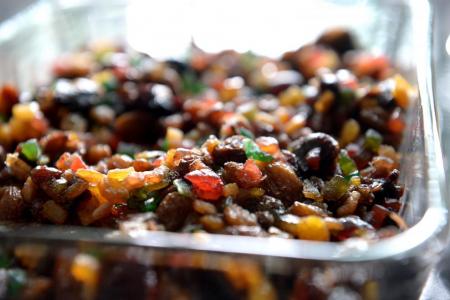These health foods aren't as healthy as you think
DRIED FRUIT
After a bowl full of these tough bits, you are nowhere near satisfied, but you would have had more sugar and calories than if you ate the fresh version.
After all, 100g of dried apple rings have 250 calories and 53g of sugar, while 100g of fresh apple has 85 calories and 10g of sugar.
Also, some of the fruit's nutrients are lost in the dehydration process.
COCONUT
Marketed as a health food with antibacterial properties, its proponents have been using it as cooking oil, adding it to vegan cheesecakes, pouring spoonfuls into oatmeal and using the cream in coffee.
However, with studies noting that coconut increases bad cholesterol and triglyceride (fat) levels, it isn't a surprise that experts have refrained from endorsing the ingredient.
Besides, if you are careful about avoiding butter, lard and palm oil, can you really trust another fat that is solid at room temperature?
VEGAN CHEESECAKE
Though you'd be hard-pressed to find a health food blog that doesn't feature a recipe for vegan cheesecake or sing its praises, these "raw power bars" are really calorie and fat bombs that should be reserved for treats.
Often made with nuts, stabilised with coconut oil, and sweetened with sugary dates or copious amounts of maple syrup (or honey if not vegan), each helping may be less processed than regular treats but usually contains more than the recommended serving of nuts (about a palmful) and delivers unnecessary sugar that you are going to have to burn off.
ENERGY BALLS
Sharing similar ingredients with vegan cheesecakes, these truffle-size balls tend to also contain chopped pieces of dried fruit, seeds and even chocolate chips.
Small though they may be, each piece has 100 calories (and that is being conservative), and while they may have more nutrients and fibre than a candy bar, calorie-wise, you are not getting away with anything.
GLUTEN-FREE PRODUCTS
According to the Celiac Disease Foundation in the US, only an estimated 1 per cent of the world's population has coeliac disease, which causes gluten hypersensitivity in the small intestine and leads to difficulty in digesting food.
Gluten-free products are neither any healthier nor lower in fat, calories or carbs than regular foods. Plus, it is a real drag to avoid its sources, which include grains such as wheat, barley, rye, spelt, farro and oats. This means you'd have to watch for pastas, baked goods, gravies, soups, salad dressings and even soya sauce.
Experts are warning against hopping on the gluten-free bandwagon as it could mean missing out on valuable essential nutrients and fibre.
A report in Epidemiology also shared that you could be exposing yourself to more mercury and arsenic, commonly found in farming chemicals used to grow rice, a popular ingredient in gluten-free products. Consider this before chewing on another bland, air-popped rice snack.
This article first appeared in Shape, the only women's health and fitness magazine in Singapore
Get The New Paper on your phone with the free TNP app. Download from the Apple App Store or Google Play Store now



